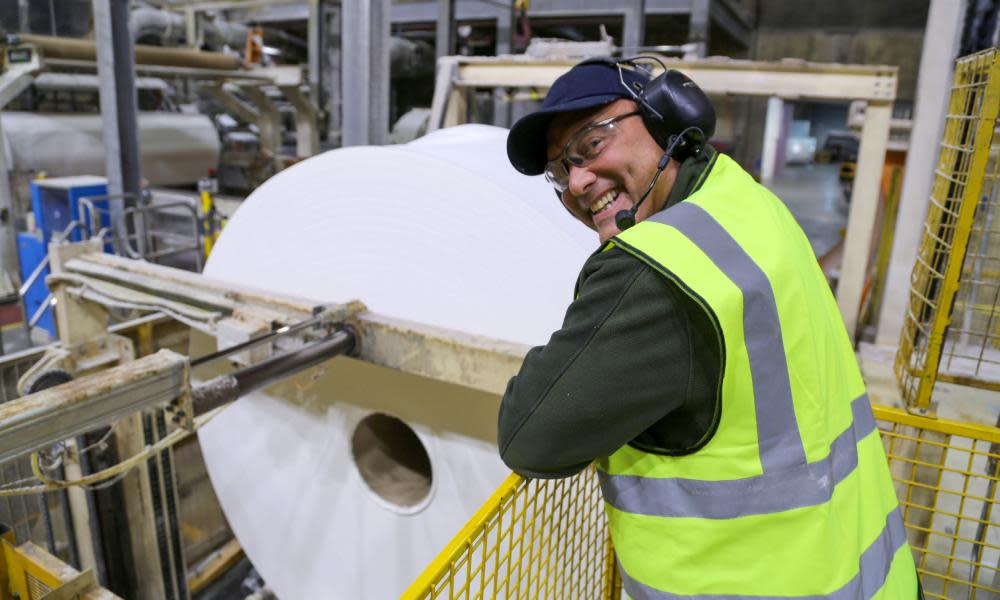Inside the Factory: Keeping Britain Going review – praise be to loo roll!

‘If King Kong used toilet paper,” said Gregg Wallace, “this is what he would use.” The MasterChef host was visiting a Manchester mill that had increased production from 700,000 to 1m toilet rolls a day to satisfy increased demand during lockdown. The British spirit of stockpiling that led Margaret Thatcher to collect tinned goods for her larder in the 70s is still thriving. The reason for his quest? A new Inside the Factory spinoff, Keeping Britain Going (BBC Two).
Before Wallace was a 1.2-tonne so-called mother roll. “That gives birth to thousands of rolls,” he explained. Does it, Gregg? Even in Call the Midwife mothers don’t give birth by being chopped into pieces by, effectively, a giant bread slicer.
Like a labrador puppy with lavatory paper, Wallace revelled in stretching metaphors to breaking point, and beyond. Before the chopping begins, he told us, this mother roll must be spliced together with another mother toilet roll in a special splicing machine. Suddenly Wallace was officiating at a wedding weirder than the one where a woman agreed to love, honour and obey the Eiffel Tower. “Do you, toilet roll,” Wallace said solemnly, “take this other toilet roll …”
Each year, the average Briton uses 100 toilet rolls. More if, as I do, you’ve been using them to make a soundproof fort to muffle screams over TV during lockdown. Joe Pasquale delivering PPE? Couldn’t he and other virtue-signalling celebs have done that without cameras? I couldn’t get toilet rolls thick enough. Seven ply. Eight ply. Nothing was fit for purpose.
Here, Wallace was doing his bit to increase scream-related toilet-roll purchases by recycling material from a two-year-old show and topping it off with catch-up interviews via video link. It was like one of those disappointing Simpsons clip shows, but with the twist that we got to see Wallace at his laptop in his den chatting to workers on the frontline of toilet-roll production. My favourite interviewee was the 24-year-old who suggested that he isn’t averse to telling prospective romantic partners where he works. It’s a steady job. Recession proof. Probably gets a staff discount, too.
Wallace found that even though some staff have been working from home during quarantine, the few who work in the mill have produced more toilet rolls than before. Which, let’s hope, won’t give managers ideas.
The programme exasperated me, because the firm that plunders koala bears’ image rights for their packaging should have paid for this free advertisement, rather than the bill being footed by licence-fee paying mugs like me.
Worse, Wallace never questioned the business he spent an hour eulogising. Is toilet roll essential? If we are to learn any lessons about sustainability as a result of lockdown, then maybe our dependence on unsustainable industries needs to be questioned. Here, though, Wallace portrayed toilet roll manufacture as sustainable. In Sweden, lavatory paper expert and possible lumberjack Bjorn told him that the hundred year old trees felled in minutes to make paper and loo roll were replaced by planting many more.
That’s as maybe, but here’s my worry. The long fibres for this brand of toilet roll come from eucalyptus pulp shipped from Brazil. They provide the raw material for the sturdy middle section of toilet paper, while the short fibres from Swedish trees provide the material for the soft outer coverings so that your ickle botty doesn’t get splinters. Even if the forests are run along sustainable lines, surely carbon footprint involved in dehydrating pulp, shipping it from two distant nations, then rehydrating it and fashioning it into roll-ups is even more loony than, say, flying beans from Kenya that can be grown here.
Wouldn’t we do better to install bidets or take the shower head off and point the nozzle where the sun doesn’t shine? Or learn from the ancients? Romans, after all, used sponges on sticks that they stored in jars of vinegar.
The truth seems, to me, to be one unexamined by Wallace. Toilet roll is neither necessary nor sufficient for that issue that concerns everyone, maximum anal daintiness. There are cultures who look on Britons’ dependence on toilet paper and despair at our lack of hygiene and concern for the environment. Yes, Britons may use 183,000 miles of toilet paper every day, enough to circle the globe 11 times, but it doesn’t have to be that way. King Kong conquered New York without wiping his jacksy. Fact.

 Yahoo News
Yahoo News 
